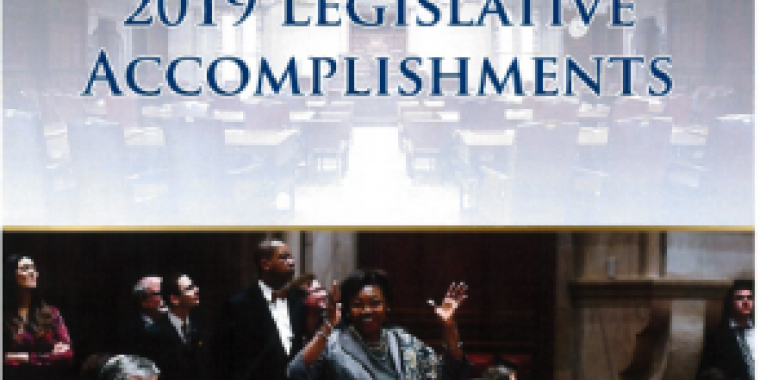
With More Than 2.3 Billion Robocalls Made To New Yorkers So Far In 2019, A/M Yuh-Line Niou and Sen. Brad Hoylman Urge Passage of Robocall Legislation
September 6, 2019
FOR IMMEDIATE RELEASE:
September 6, 2019
NEW YORK, NY – With more than 2.3 billion robocalls placed to New Yorkers so far in 2019, and more than 38.7 billion robocalls placed nationwide, Assemblymember Yuh-Line Niou (D/WF-Manhattan) and Senator Brad Hoylman (D/WF-Manhattan) held a press conference today with leaders from AARP and Consumer Reports to urge passage of the Robocall Prevention Act (A.675D/S. 3297D). The press conference immediately preceded an Assembly hearing examining actions to combat robocalls, nuisance phone calls, and spoofing. The Robocall Prevention Act would effectively ban unwanted robocalls in the state of New York by:
- Requiring telephone service providers to make call blocking technology available to their customers free of charge;
- Allowing New Yorkers to revoke their consent to receive robocalls, and requiring robocallers to comply with a request to stop calling or face significant penalties;
- Enacting state-level prohibitions against fraudulent caller ID spoofing by robocallers;
- Strengthening protections for landlines, which have less protection than cell phones under federal law;
- Giving the New York State Attorney General new authority to pursue penalties against illegal robocallers;
- Giving New Yorkers a private right of action to go after violators themselves, and allowing courts to award treble damages for those who knowingly and willfully violate the law; and
- Requiring the Department of State and the Department of Public Service to annually report on illegal robocalls made to New Yorkers.
Senator Hoylman said: “There isn’t an issue I hear more about from constituents than the proliferation of robocalls. These calls aren’t just annoying—they’re dangerous, and often used to defraud unsuspecting consumers, seniors, and vulnerable New Yorkers.
“Though it is heartening that Congress has passed bills on the issue, there has not yet been a change in federal law and New Yorkers can’t wait for our dysfunctional government in Washington D.C. to act. We need strong laws here in New York to provide relief to our consumers. The Robocall Prevention Act will crack down on illegal robocalls and those who make them. I’m proud to have passed this bill through the Senate by unanimous vote this year, and grateful for the support of Senate Majority Leader Andrea Stewart-Cousins and Senator Kevin Parker. I will continue to move these essential protections against robocalls forward with Assembly Member Niou. New York consumers must be shielded from unwanted harassment and predatory behavior.”
Assemblymember Niou said: "Unwanted and predatory robocalls continue to plague New Yorkers and have surged in volume over the past years. While some progress has been made on the federal level, it is not nearly enough to protect New Yorkers. Robocall scams become more advanced each day, targeting seniors or immigrants in their native language and defrauding our community members of millions of dollars. In my district, we continue to receive calls from constituents who have fallen prey to scam robocalls that request money in exchange for free trips, packages they have forgotten to pick up, or immigration assistance for a family member in another country. Some scam robocalls pretend to represent the Chinese Consulate and demand money from individuals to allow them to stay in the United States. We deserve better. The time is now to pass comprehensive legislation and create real protections for New Yorkers before more harm is done. Thank you to Senator Hoylman for his leadership in the Senate and the advocates who support our bill. I look forward to continuing our fight in the Assembly to pass this common-sense legislation and providing New Yorkers with real safeguards to fraudulent robocalls.”
“Scammers target older people – who have saved money and built equity in their homes,” said AARP Associate State Director Chris Widelo. “As a membership and social mission organization for Americans 50 and over, AARP fully supports this bill to specifically target scam robocalls by Senator Hoylman and Assembly Member Niou, and we thank them for their persistence and leadership in fighting for this legislation. In particular, provisions aimed at stopping caller ID spoofing and strengthening enforcement action against those making these illegal robocalls will go a long way toward protecting AARP members and all New Yorkers.”
Chuck Bell, Programs Director for Consumer Reports said, “Consumers are hopping mad about robocalls that invade their lives at every hour of the night and day. Robocalls are also more than just a nuisance. Telephone scammers use robocalls to rip off the elderly, immigrants and other vulnerable consumers, resulting in an estimated $9 billion in financial losses every year. “
The New York Robocall Prevention Act will bring much overdue protection to New York consumers, and lead the nation in expediting access to new call-blocking technology. We commend Senator Brad Hoylman and Assembly Member Yuh-Line Niou for their leadership in developing and fighting for this critically important legislation.”
"Robocalls invade New Yorkers' privacy and expose them to scams and possible identity theft, and occur billions of times each month," said Richard Berkley, Executive Director of the Public Utility Law Project of New York. "The recent strong steps by Attorney General Leticia James and her multi-state coalition will help protect consumers, but there remains a vital role for state protective legislation like that introduced by Senator Hoylman and Assemblywoman Niou." "We applaud their focus on protecting New York's consumers."
Earlier this year, Assemblymember Niou and Senator Hoylman together released an op-ed in Crain’s New York Business entitled New Yorkers can cut the line on robocalls.
###
related legislation
Share this Article or Press Release
Newsroom
Go to NewsroomSenator Hoylman's Senior Resource Guide
July 1, 2019
2019 Legislative Session Accomplishments
June 24, 2019
